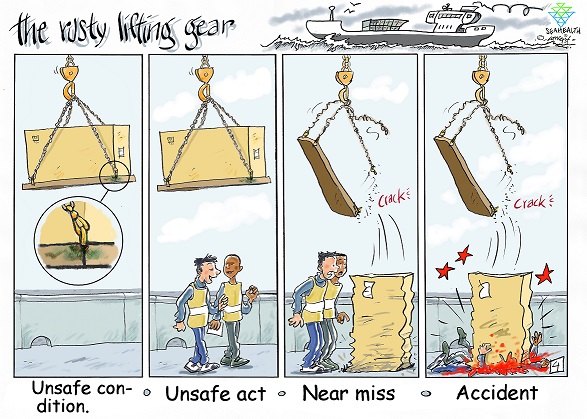some industries are better at having a real safety culture than others. When I was in the union we watched safety videos once a week and everyone was very safety conscious, especially the officers.
in recent days I have seen the opposite effect and it seems many people dont have the basics of safety 101. i think companies need to spend more time/money on safety training. maybe they need to get with the shipping companies and ask them how they do it, and/or hire third parties to come in and teach. i saw a lot of better safety practices in deep sea shipping. it seems that most places that are not deep sea shipping and non union, the old school mentality is resistant to change and dont like to be made enlightened to safety issues, no matter what the shore side might preach.
[QUOTE=RichMadden;151656]I would agree. Depending on which incident at which you are looking - the potential injury or the potential cargo gear failure - it could be viewed as an incident from the get-go. I believe the intent was to show the near injury, however.
While most SMS manuals will define the terms and provide methods of reporting, it is sometimes difficult to get the understanding and buy-in from the whole crew. I’ve found that posting something like the above cartoon adjacent to the menu outside the galley will sometimes get people thinking about it. There are many ways to address safety - this is but one that I have found to be effective.
Quoting from IMO MSP-MEPC.7/Circ. 7 ““Guidance On Near-Miss Reporting””,
"3 Overcoming barriers to reporting near-misses
3.1 There are many barriers related to the reporting of near-misses. In many cases,
near-misses are only known by the individual(s) involved who chose to report or not report the
incident. Some of the main barriers to the reporting of near-misses include the fear of being
blamed, disciplined, embarrassed, or found legally liable. These are more prevalent in an
organization that has a blame-oriented culture. Amongst other barriers are unsupportive
company management attitudes such as complacency about known deficiencies; insincerity about
addressing safety issues and discouragement of the reporting of near-misses by demanding that
seafarers conduct investigations in their own time.
3.2 These barriers can be overcome by management initiatives such as:
.1 Encouraging a “just-culture” in the company which covers near-miss reporting.
.2 Assuring confidentiality for reporting near-misses, both through company policy
and by “sanitizing” analyses and reports so that personal information (information
identifying an individual) of persons associated with a near-miss is removed and
remain confidential. Personal information should not be retained once the
investigation and reporting processes are complete.
.3 Ensuring that investigations are adequately resourced.
.4 Following through on the near-miss report suggestions and recommendations.
Once a decision has been made to implement, or not implement, the reports’
recommendations should be disseminated widely."
Of course, this is in an ideal world, in which we do not necessarily work. However, if a company is serious about implementing an effective safety program and improving their safety culture, there should not be repercussions. Points to ponder.[/QUOTE]
